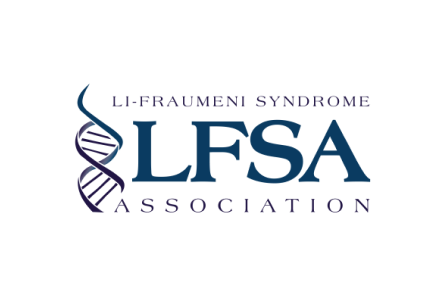Li-Fraumeni Syndrome Association
Cycle 1
Li-Fraumeni Syndrome (LFS) is an inherited predisposition to a wide range of certain cancers caused by pathogenic TP53 germline variants. Both children and adults are susceptible to developing multiple cancers, most notably soft-tissue and bone sarcomas, breast cancer, brain tumors, adrenocortical carcinoma and leukemia. Other cancers seen in LFS patients include gastrointestinal cancers and cancers of the lung, kidney, thyroid, skin, and prostate, among others.
Last updated 04/30/2025
Clinical
Disease Class
Genetic diseases
Neoplastic diseases
Body Systems
Cardiovascular / Circulatory
Digestive
Endocrine
Hematopoietic / Lymphatic / Immune
Integumentary / Exocrine
Muscular / Skeletal
Nervous / Sensory
Reproductive
Respiratory
Organs
Blood
Brain
Connective tissue / joints
Ductus deferens
Fallopian tubes
Intestines
Kidneys
Lungs
Ovaries
Pancreas
Penis
Prostate gland
Scrotum
Skin
Stomach
Testes
Thyroid
Uterus
Known Genetic Link
Yes, one or more genes directly cause the condition
causative_genes
TP53
contributory_genes
None specified / unknown
Type of Inheritance
De novo
Newborn Screening
No
Disease Mechanism(s)
Altered DNA repair mechanism
Epigenetic aberration
Pathogenic mutation
Protein misfolding
Age of Onset
Adolescence (12-17)
Adulthood (age 18-64)
Early childhood (age 1+-5)
Elderly (age 65+)
Infancy (age 0-1)
Middle childhood (6-11)
Prebirth
Average Age at Diagnosis
Adolescence (12-17)
Adulthood (age 18-64)
Early childhood (age 1+-5)
Elderly (age 65+)
Middle childhood (6-11)
Life Expectancy
Adolescence (12-17)
Adulthood (age 18-64)
Middle childhood (6-11)
Affected Sex(es)
Female
Male
National Prevalence
1001-10000
Global Prevalence
1001-10000
National Incidence
Less than 10
Global Incidence
Less than 10
Populations and/or ancestry with higher prevalence
Brazil
Symptoms / Phenotypes
cancer / carcinoma / tumor / malignancy, unspecified
cancer, adrenocortical carcinoma
cancer, brain tumor
cancer, breast
cancer, leukemia
Biomarkers
None
Existing Therapies
Other
· There are no specific therapies, however, the multiple cancers are treated within the cancer type...there is ongoing research we support in order to be able to actually have a therapy that isn't harmful to the majority of our patients...early detection of the multiple cancers currently.
Organizational & Research
Cell Lines
None
Cell Lines, Institution
None
Cell Lines, share
N/A
Disease Model
Mouse
Other
Zebrafish
Disease Model, Involvement
Funded
Disease Model, share
Unsure
Clinical Trial Role
Data sharing
Focus group
Funding
Recruitment and outreach, patients
Recruitment and outreach, trial sites/physicians
Results dissemination, publication
Study material design, review (not protocol)
Study protocol design, review
Biobank, Institution
City of Hope National Medical Center
Dana-Farber Cancer Institute
NIH
Biobank, Involvement
Consulted
Funded
Center of Excellence, Institution
Aflac Cancer and Blood Disorders Center
Aurora Health Care – Wisconsin
Baylor College of Medicine
Children's Hospital of Colorado
Children's Hospital of Michigan
Children's National Hospital
Children’s Hospital of Philadelphia (CHOP)
Cincinnati Children's Hospital
City of Hope National Medical Center
Dana-Farber Cancer Institute
Duke University
Garvan Institute – Kinghorn Cancer Centre and Cancer Division
George Washington University
Hospital A. C. Camargo – Fundação Antonio Prudente
Hospital for Sick Children
Huntsman Cancer Institute
Istituto di Ricovero e Cura a Carattere Scientifico (IRCCS)
Manchester Centre for Genomic Medicine
Massachusetts General Hospital
Medizinische Hochschule Hannover
Memorial Sloan Kettering Cancer Center
Moffitt Cancer Center
National Cancer Institute (NCI)
Nationwide Childrens Hospital
Netherlands Cancer Institute
Novant Health Presbyterian Medical Center
Peter MacCallum Cancer Center
Peyton Manning Children’s Hospital
Seattle Children's Hospital
Sheba Medical Center
St. Jude Children’s Research Hospital
Stanford University
The Ohio State University (OSU)
The University of Texas MD Anderson Cancer Center
University of Michigan
University of Minnesota
University of Pennsylvania (PENN)
University of Virginia (UVA)
Universitätsklinikum Bonn
Universitätsklinikum Heidelberg und Deutsches Krebsforschungszentrum
Universitätsklinikum Tübingen
Universitätsklinikum Ulm
Washington University
Center of Excellence, Involvement
Consulted
Designed
Endorsed/Certified/Accredited
Registry
Yes, we have collaborated on a registry
Data Collected, Registry
Clinical data
Electronic health records/electronic medical records
Genetic data
Imaging data
Longitudinal natural history data
Medication usage
Patient-reported data
Data Entered by, Registry
Both
Platform, Registry
Not specified
Natural History Study
Yes, we have collaborated on a natural history study
Data Collected, Natural History Study
Clinical endpoints (outcomes)
Electronic health records/electronic medical records
Genetic data
Imaging data
Patient-reported outcomes
Prospective data
Retrospective data
Platform, Natural History Study
Not specified
FDA Patient Listening Session
No
FDA Patient-Focused Drug Development (PFDD) Program
No
ICD Codes
We are working on obtaining an ICD-10 code
We use an ICD-10 code capturing the family of diseases to which our disease belongs
Diagnostic Guidelines
Yes, we have guidance available on our website
Yes, we have published formal guidelines in a peer-reviewed journal
Science Advisory Board Policies
Yes, not willing to share SAB policies
Research Network Policies
Has CRN but no policies
Research Roadmap
We don't have a Research Roadmap
International Chapters
Africa
Asia
Europe
Middle East
North America
South America
International Partners
Europe
South America
